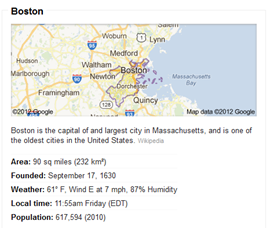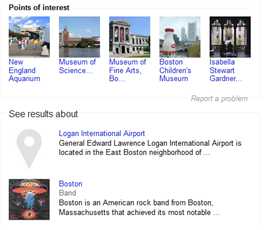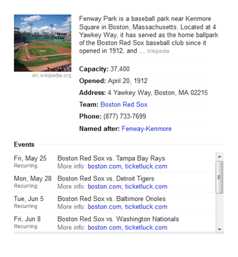Google has already started implementing their Knowledge Graph in search results.

Search Results will Include Expanded Information
Some of the things you’ll see on Google search engine result pages include links to different results based on the context of your search, a summary of information on your topic visible in the side bar, and information boxes that offer additional information based on popular searches.
For example, a search for “Boston” returned a city map, summary, and information related to the topic on the right side where ads usually are. The really cool thing is Google now knows that there is also a popular band named “Boston” and displays other possible results below the topic facts.
Initially, this change may not affect businesses' SEO campaigns directly, and they should continue with their current strategies. Long-term effects will depend on the depth Google goes to in providing relevant information based on the relationships of searches.
For some companies, it may provide data of when it was founded and other industry links when searched. This will make the most relevant information about company visible, as Google strives to provide the best information to users.

These changes will open up broader connections of keywords for better AdWords targeting across topics, not just on specific phrases. Couple that with the emphasis on location-based searches and Google is more powerful than ever at providing targeted ads and useful content.
"This is a critical first step towards building the next generation of search, which taps into the collective intelligence of the web and understands the world a bit more like people do."
The Knowledge Graph will also be available on mobile platforms.
This will provide the best information for users on the go and it even provides real-time results for events and things going on at that location.When I searched for “Fenway Park”, you can see Boston Red Sox have a game on May 25th with links to purchase tickets below. This information was provided without having to do an additional search for “Boston Red Sox tickets.”
Moreover, less typing on your cell phone or tablet creates a better experience for the user.
The ultimate goal is for the Knowledge Graph to actually understand in-depth queries. Maybe someone wants to know which birds migrate through their area.

Google could provide a map of migration patterns, a list of species, and times they usually go north or south. Maybe you want to know how many left-hand NBA players made All-Conference. Google could provide you with a list of players, their stats, alma maters, and teams they played for.
This will undoubtedly make Google a one-stop place for basic information and it will be interesting to see the effects on 3rd party sites’ Web traffic, as Google continues to cut out the middleman in pursuit of and efficient user experience.



Submit a Comment
Your email address will not be published. Required fields are marked *